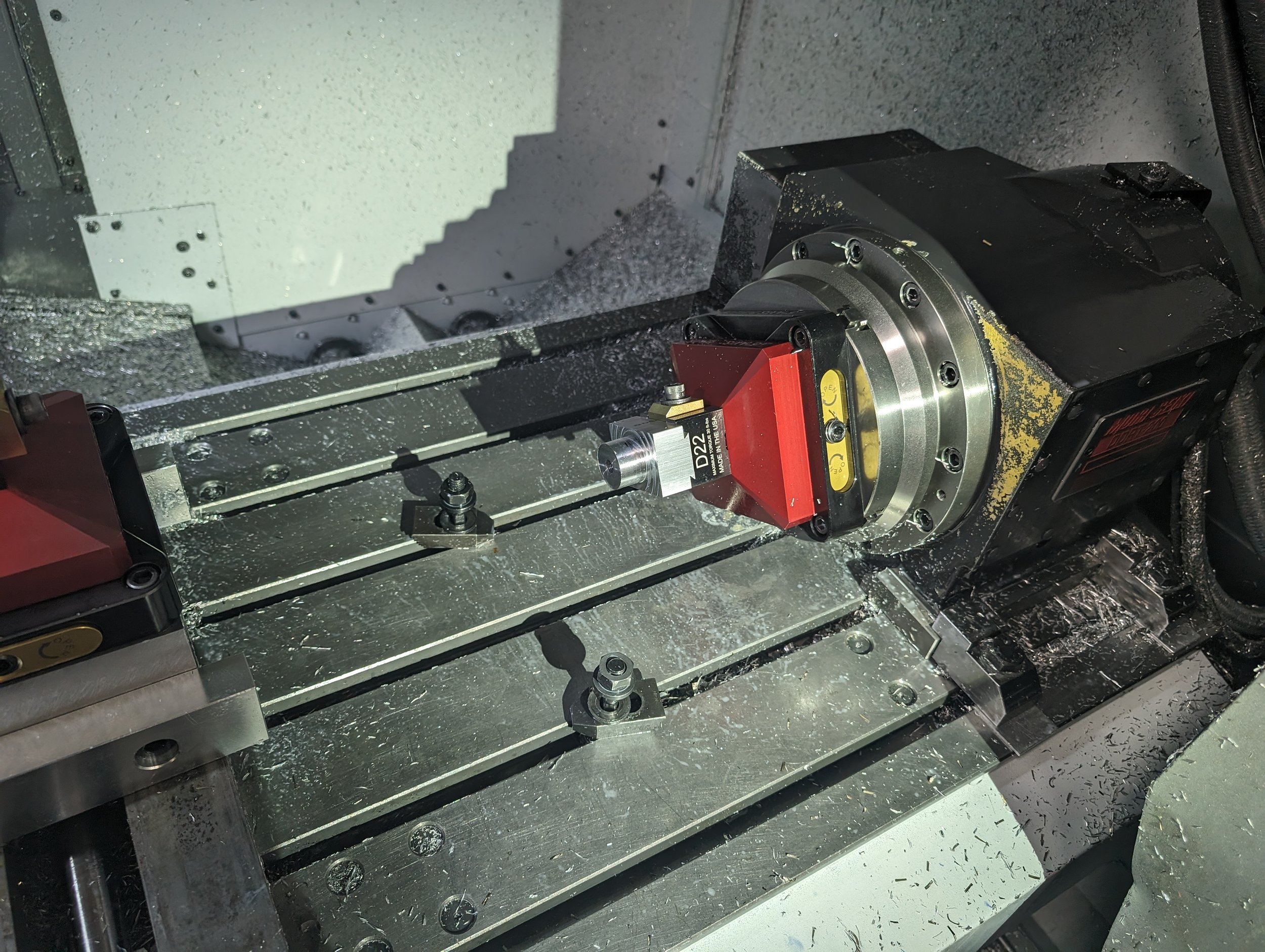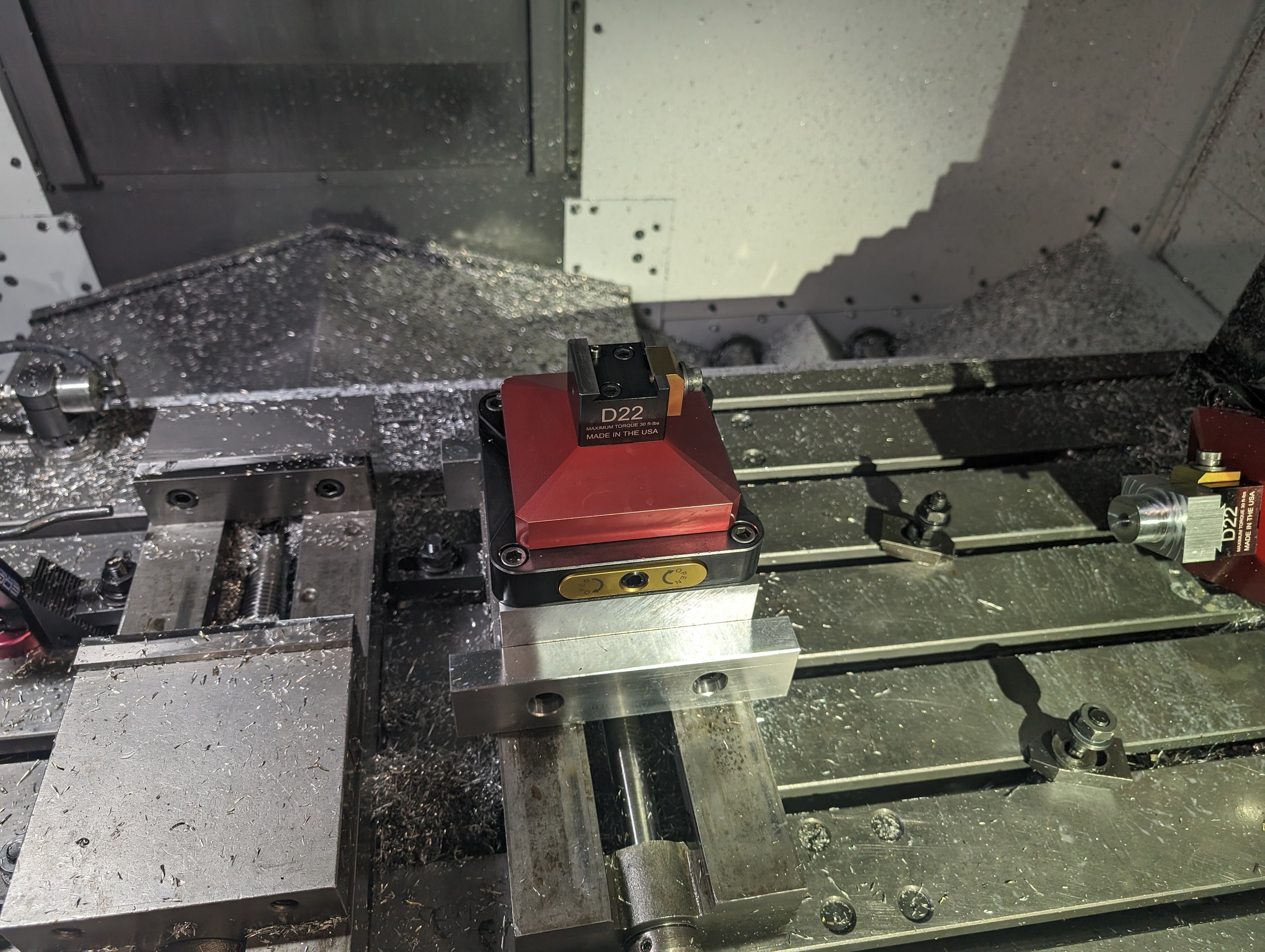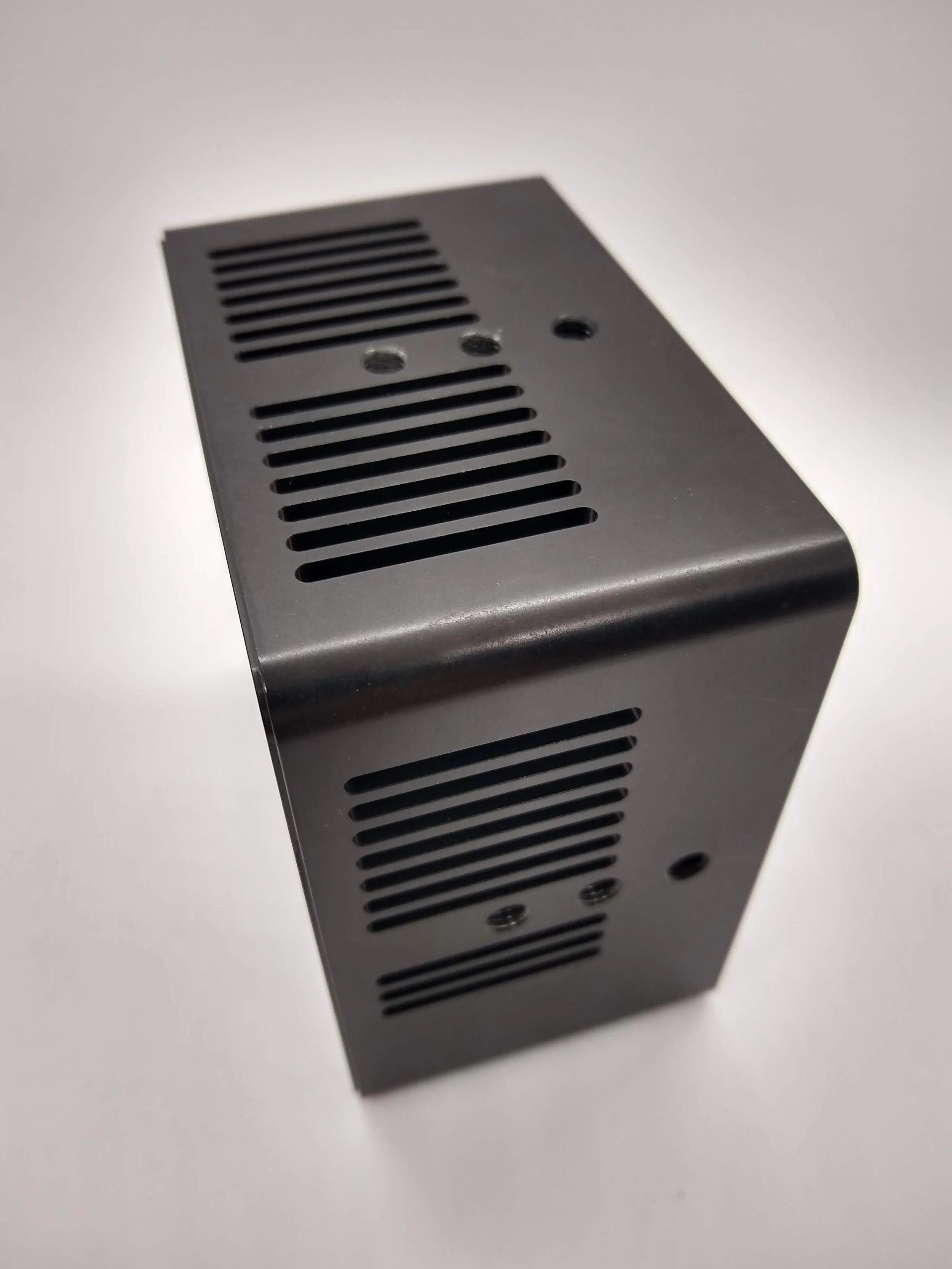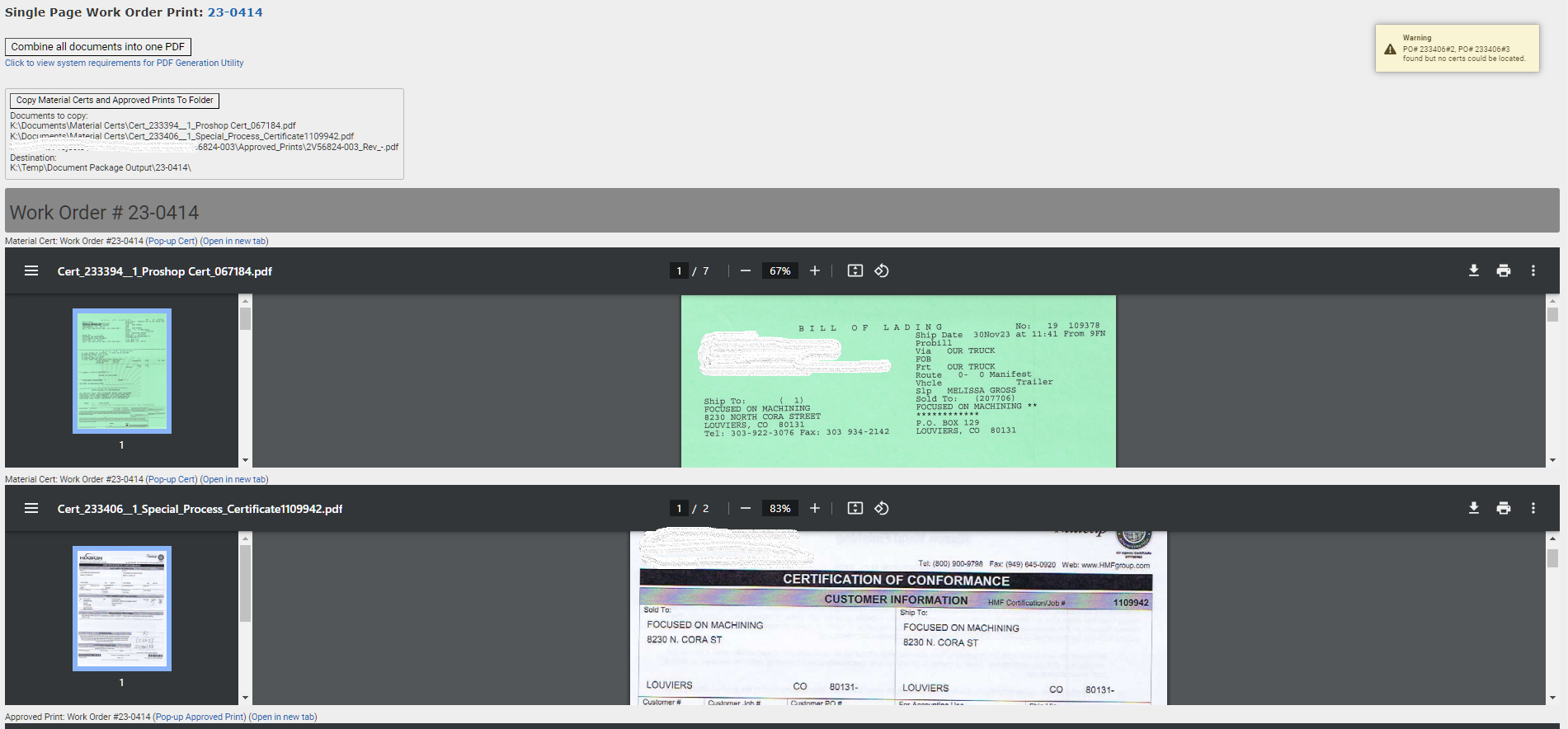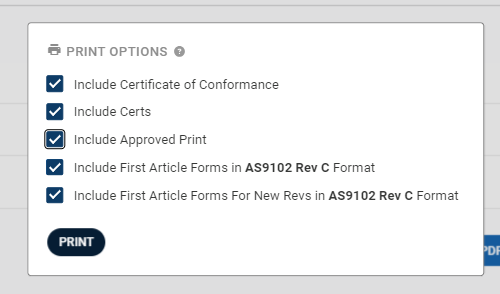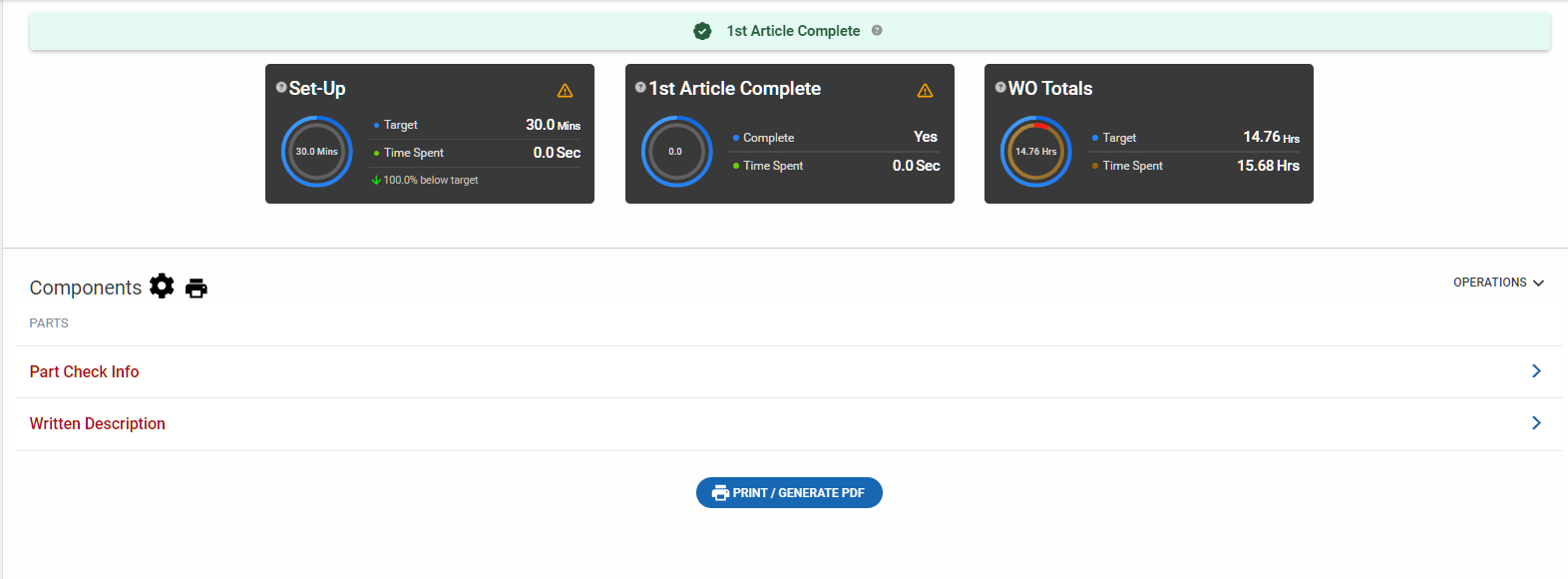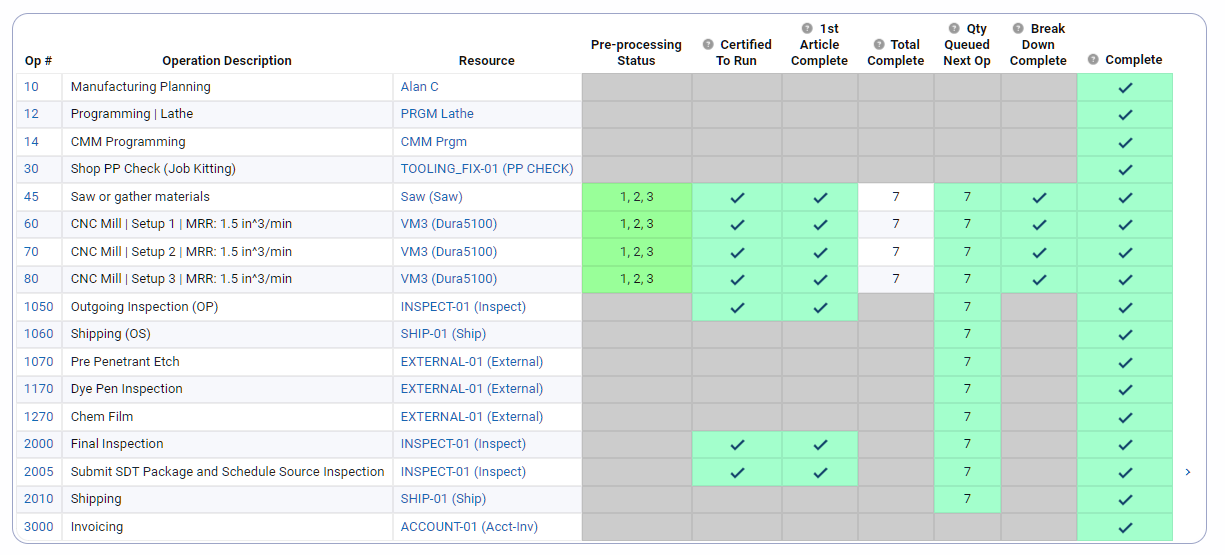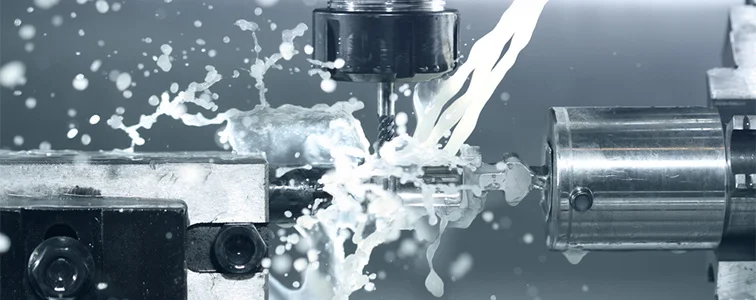
BLOG
Zero-Point Fixturing: Our Approach to Complex Aerospace Machining Job
A recent trend in aerospace machining is that parts are becoming so complex that traditional equipment and approaches are no longer sufficient. Aerospace buyers often need parts with exceptionally tight tolerance features on opposite or multiple sides, which can be difficult to achieve with a standard CNC mill. At Focused on Machining, we’ve found great success leveraging multi-axis machining with zero-point fixturing to take on the most challenging aerospace machining jobs.
A recent trend in aerospace machining is that parts are becoming so complex that traditional equipment and approaches are no longer sufficient. Aerospace buyers often need parts with exceptionally tight tolerance features on opposite or multiple sides, which can be difficult to achieve with a standard CNC mill.
5-axis and multi-axis machining have emerged as gold-standard solutions for machining these parts, enabling shops to achieve the precision and efficiency required to feel confident quoting them.
At Focused on Machining, we’ve found great success leveraging multi-axis machining with zero-point fixturing to take on the most challenging aerospace machining jobs.
Our Shop’s Zero-Point Fixturing Solution
We invested in a RockLock base permanent fixturing setup for each of our multi-axis machines. The RockLock base allows us to swap vises and fixtures quickly with no setup time and guarantees repeatability of less than 0.0003”.
Here’s a comparison of how a complex aerospace machining job would proceed without zero-point fixturing vs. how it proceeds with zero-point fixturing.
Aerospace machining without zero-point fixturing
Let’s say we’re machining a tight tolerance part with three operations using a traditional setup without zero-point fixturing. Operation 1 is easy enough because we’re just machining raw stock to establish the datums from which Operation 2 and 3 will be measured.
However, once we get to Operation 2, things become more complicated. Let’s say we need to flip the part upside down or sideways to machine a different side. If the tolerances are exceptionally tight, the machinist will need to reposition the part and use a manual indicator to orient it perfectly in the machine. The machinist will then need to do the same thing with every single part in the order, which, as you can imagine, makes for an incredibly inefficient process.
This approach may be feasible if there are only 5-10 parts in an order. But most shops can’t justify having a machinist perform this degree of manual work for higher-volume orders—and the cost of doing so would make buyers’ jaws drop.
Aerospace machining with zero-point fixturing
With zero-point fixturing, the extensive manual work is eliminated. The vise enters a base that has pins in it with precise locating capabilities. We machine Operation 1 in that vise in one location to achieve all the Operation 1 features. Then, we take the entire vise up and out of the machine and move it to the Operation 2 fixture. The machine knows exactly where that part is within 0.0001” from Operation 1. No manual indicating is required, allowing us to work much more efficiently. Once we have proven the first part, we can machine multiple parts in the same setup.
Quality control
Even quality control is more efficient with zero-point fixturing. We have a RockLock base in our quality department, so if we program everything from the center of the vise—including the CMM—we can take the whole vise and part out of the machine, move it over to quality, and it will repeat there within 0.0001”. The quality department can run its program without spending time locating the part. If a change is required, we move the vise and part back to the machine and quickly make adjustments.
Meeting the Evolving Needs of the Aerospace Industry
As an AS9100 machine shop, Focused on Machining is committed to meeting the evolving needs of the aerospace industry. Multi-axis machining with zero-point fixturing allows us to take on complex jobs with the same precision and efficiency as 5-axis machining.
We love a good challenge, so don’t be afraid to approach us with your toughest aerospace machining requirements. Request a quote today!
How Long-Term Manufacturing Contracts Benefit Customers
If you find yourself placing repeat orders for the same parts multiple times in a year, consider establishing a long-term contract with your manufacturing partner. Not all shops provide contract manufacturing services, but those that do are almost always open to discussing this option with customers. That’s because long-term contracts benefit buyers and precision machine shops alike.
If you find yourself placing repeat orders for the same parts multiple times in a year, consider establishing a long-term contract with your manufacturing partner. Not all shops provide contract manufacturing services, but those that do are almost always open to discussing this option with customers. That’s because long-term contracts benefit buyers and precision machine shops alike.
Buyers benefit from better pricing, greater flexibility, and unbeatable consistency, while shops benefit from operational efficiency and the ability to predict their cash flow months in advance.
3 Benefits of a Long-Term Manufacturing Contract
Let’s say you need 100 parts for the year, but you want to spread that out into four deliveries of 25 parts, each spaced three months apart. Simply communicate this request to your precision machine shop and reap the benefits of a long-term contract.
1. Better pricing
The higher the quantity of parts you order, the lower the price per part. The shop has better purchasing power with material and plating vendors and can pass the cost savings on to you. More importantly, programming and setup—which can be time-consuming and costly—need only to occur once, and the cost is spread across many parts.
Think about it: if you have a complex part that requires three hours of programming and four hours of setup, totaling $700, and you only order one part, you're looking at an astronomically high price per part. Spread that cost across 10 parts, and your price per part decreases to $70. Now, spread that cost across 100 parts; your price per part is only $7.
Even in cases where the savings associated with programming and setup are minor—like if you're adjusting an order from 50 to 100 parts—many precision machine shops will be willing to reduce costs even further to account for the financial certainty they gain.
2. Greater flexibility
When you enter a long-term contract, the precision machine shop machines the entire order at once, ships you the parts you need immediately, and stores the rest of the inventory on their shelves. That means if you suddenly need your second delivery of 25 parts a month sooner than initially planned, the shop can easily accommodate your request. You get the flexibility you need without having to worry about placing costly rush orders.
3. Unbeatable consistency
There are many variables in the manufacturing process—from machining to plating—and the more those variables are reduced, the better the consistency is from part to part, from order to order. Even two different batches of parts that both meet print specifications will inevitably exhibit some variability, which can cause problems for buyers, especially when those parts go into complex assemblies.
When a precision machine shop has the opportunity to make 100 parts in one batch instead of 25 parts in four batches, buyers enjoy unbeatable consistency.
Is a Long-Term Contract the Right Fit for You?
It’s important to note that not all parts are suitable candidates for contract manufacturing services. If you can check these boxes, you could benefit from a long-term contract:
1. You authorize the shop to machine all the parts at once.
Machining all the parts at once is what allows shops to offer reduced pricing. The shop then holds the inventory on their shelves and ships the parts to you on a predetermined schedule.
2. You don’t anticipate revision changes.
Because shops must machine all the parts at once, long-term contracts are ideal for established parts and aren’t a good fit for parts in early engineering that may undergo revision changes.
3. You need a high quantity of parts.
The beauty of a long-term contract is that it’s mutually beneficial for both parties: buyers and shops. When the quantity of parts is too low, a shop doesn’t benefit much from the agreement. We can’t speak for all shops, but at Focused on Machining, we typically look for orders totaling a minimum of 100 parts over a year.
Start a Conversation about Contract Manufacturing Services
If you’re interested in discussing contract manufacturing services, let us know when you request a quote. It could be as simple as telling us, “I’d like to order 100 parts, but I’ll need them over six months.” We’re always willing to discuss the options with you and come to an agreement that makes everyone happy.
Don’t Let Cost Get in the Way of Selecting the Right Plating Vendor
One of the most important truths in manufacturing is that you get what you pay for—from production machining services to secondary processes like plating. Just as machine shops' costs and lead times vary depending on capabilities, certifications, and quality, so is the case for plating vendors.
One of the most important truths in manufacturing is that you get what you pay for—from production machining services to secondary processes like plating. Just as machine shops' costs and lead times vary depending on capabilities, certifications, and quality, so is the case for plating vendors.
A local anodizing house that doesn’t offer much in the way of certifications and quality control might charge $100 per batch and get parts done the same day. Fast and cheap is fine for a simple part with standard tolerances. But if you’re dealing with a tight-tolerance part for a mission-critical aerospace or defense application, you can’t afford to skimp on quality—and that means being open to higher costs and longer lead times.
The True Value of High-End Plating Facilities
We understand that customers appreciate having insight into what they’re paying for, so let’s take a look at how high-end plating facilities justify their higher costs and longer lead times.
High demand
There is often a large discrepancy between lead times at a local plating shop (1-2 days) and at a high-end, nationally recognized plating facility (2.5-3 weeks). That’s because the latter companies are in high demand, fulfilling orders from large government contractors that have them on their approved supplier lists. Generally, companies that are in high demand have excellent, well-earned reputations.
Critical certifications
Just like the best precision machine shops are ISO 9001:2015 and AS9100-certified, the best plating houses maintain NADCAP certification, a critical requirement for many aerospace and defense customers. Pursuing and upholding NADCAP certification can be costly, so it’s expected that NADCAP-certified plating houses charge higher prices. For example, a standard shop may charge a $100 lot fee, and a NADCAP-certified shop may charge up to $200.
Superior processes
While some plating processes are relatively straightforward, others, like anodizing, are highly complex and difficult to perform well.
Anodizers must monitor and control many factors, including the mix and ratio of chemicals and the temperature of the tank, to ensure high-quality results. Furthermore, because anodize adds buildup to material, anodizers must consider this additional factor when working with tight-tolerance parts where every ten-thousandth inch matters.
It takes a team of experienced chemists to develop the right processes to account for these factors. When a plating house isn’t up to the task, project timelines can easily become derailed—as we’ve learned the hard way.
You Get What You Pay For: A Real Example
Recently, 80 of 150 parts returned to us from an anodizing house exhibiting unsightly spots. We knew our best bet was to have the vendor strip the anodize and re-dip the parts, but previous experience had shown us that when plating houses don’t have their etching or stripping process dialed in perfectly, they remove too much material, and the parts end up out of tolerance.
We had the vendor strip the parts and send them back to us. Sure enough, they had removed too much material. Upon investigation, the vendor found that they had not only over-stripped the parts but also over-etched them early on. We had to make new calculations to ensure that the parts would be in tolerance, knowing the whole time that we might end up having to remake 80 parts from scratch if the plating house couldn’t get it right.
Losing weeks to the plating house’s missteps was a good reminder that you get what you pay for in manufacturing. Had we been able to send those parts out of state to a higher-end plating house for an extra $2 per piece, the order would have been delivered on time in perfect condition.
Don’t Get Caught Up on Dollars and Cents
We understand that time and money are critical considerations for customers seeking production machining services. But if we can offer one bit of advice from our experience, it’s not to get caught up on dollars and cents when negotiating costs. Doing so puts significant strain on shops to slash prices at the expense of quality. More often than not, both parties wind up losing out.
The truth is there’s a proper plating facility for every part, depending on its requirements. Allowing cost to get in the way of finding the right fit is a recipe for unmet expectations and unsatisfied customers.
If you’re on a tight budget, talk to us about what you need. In some cases, we may recommend an alternative plating process, like chem film in place of anodizing, that can get you the desired results without sacrificing quality. No matter what, we’re committed to finding a solution.
Request a quote for production machining services!
Why Our Precision Machine Shop Loves Source Inspections
Many shops view source inspections as a necessary evil. Source inspections can indeed be cumbersome for shops whose processes are still mostly manual—there’s no denying that. Fortunately, at Focused on Machining, our robust ERP system allows us to facilitate source inspections easily. In fact, we’ve even come to really appreciate source inspections and the customers who require them.
Many shops view source inspections as a necessary evil. Source inspections can indeed be cumbersome for shops whose processes are still mostly manual—there’s no denying that.
Fortunately, at Focused on Machining, our robust ERP system allows us to facilitate source inspections easily. In fact, we’ve even come to really appreciate source inspections and the customers who require them.
The Role of Source Inspections in Defense and Aerospace Machining
Source inspections are a common requirement among large aerospace and defense companies like Lockheed Martin and United Launch Alliance that deal with mission-critical parts. When a shop completes a precision machining order, the company will send a quality representative to its facility to confirm that the parts meet all specifications before they are shipped.
The source inspector will review the parts’ documentation (e.g., material certifications, plating certifications, print, inspection results) and conduct their own quality control inspections or ask the shop to demonstrate how their quality control team inspected the parts.
The goal is to identify issues proactively and prevent the lengthy back-and-forth that can occur when those issues are identified after the parts reach the customer. At Focused on Machining, we view this benefit as a win-win for shops and customers alike. While source inspections slow the process down initially, we appreciate knowing that once a source inspector has signed off on a job, those parts won’t return to us for additional work.
How Our ERP System Enables Easy Source Inspections
Documentation is an essential part of a source inspection—and that’s where many shops struggle.
For example, one of our customers requires that we upload our documentation to one website and use a different website to schedule a call. This company’s source inspector prefers to review the documentation virtually before coming for an on-site visit. We can then correct any issues so that by the time the source inspector arrives at our facility, chances are high that they’ll approve the parts that day.
Understandably, shops with manual documentation processes can find it challenging and time-consuming to locate material certifications, plating certifications, prints, inspection results, and more and combine all that information in one neat package. But with our ERP system, this process is as easy as clicking a button. The system pulls the necessary information from different documents we’ve already uploaded and packages it together for us to save in a clearly labeled folder.
Source inspectors who have worked with our shop for defense and aerospace machining orders appreciate that they receive one file with all information organized in a sensible manner.
Want a Source Inspection? Let Us Know During Quoting
If you need a source inspection for your next defense or aerospace machining order, Focused on Machining is more than happy to accommodate you. We simply ask that you let us know during quoting so we can build a source inspection into our timeline and quote your lead time accurately.
Even if you don’t require an official source inspection, you’ll receive the same documentation package we deliver to companies that do. That’s because our commitment to providing stellar service extends to every customer we work with.
Request a quote for defense or aerospace machining services!
Could You Benefit from Contract Manufacturing Services?
Reducing the costs of machined parts can be as easy as having a conversation: always communicate with a shop about your purchasing intentions. If you plan to place a particular order on a recurring basis, the right contract manufacturing services partner can talk to you about opportunities to obtain the best costs over time with a long-term contract.
Reducing the costs of machined parts can be as easy as having a conversation: always communicate with a shop about your purchasing intentions.
If you plan to place a particular order on a recurring basis, the right contract manufacturing services partner can talk to you about opportunities to obtain the best costs over time with a long-term contract.
Here, we’ll review key considerations to get the most from contract manufacturing services and what to look for in a partner.
Considerations for Long-Term Manufacturing Contracts
Cost and delivery schedule
Costs vary depending on the buyer’s preferred delivery schedule. In the simplest terms, shops think about costs in three tiers:
Highest price = a low quantity of parts delivered immediately
Mid-range price = a high quantity of parts delivered in multiple shipments over a fixed period of time (e.g., quarterly)
Lowest price = a high quantity of parts delivered immediately
In other words, even if you can’t justify option #3, you can talk to your shop about option #2 and save money compared to option #1.
Potential for revisions
Some orders are a better fit for long-term contract manufacturing services agreements than others. An essential factor to consider before entering a contract is the potential for part revisions.
For example, suppose you agree to order 10 parts per month over six months with the understanding that the shop will machine all 60 parts at once and ship them from inventory. What happens if there is a revision change in that time? Who is liable for the parts that can’t be used: the shop or the customer? Most shops will clarify in their contracts that they can’t be held liable for engineering changes, leaving you to pay for parts you don’t actually need.
To avoid this risk, we recommend long-term contract manufacturing services for mature parts unlikely to undergo revisions.
But wait—if a part you plan to order on a recurring basis may undergo revisions, you still have options! In these situations, consider a blanket PO. When you submit a blanket PO to Focused on Machining, you agree to purchase X parts per month over Y months, but we won’t machine the parts all at once, giving you the opportunity to make minor revisions.
Blanket POs allow us to plan for the best (i.e., most cost-effective) path forward. For instance, we might design tooling and fixturing to improve efficiency or negotiate lower prices with material suppliers, leading to cost savings that we can pass on directly to you.
Assembly needs
Entering a long-term contract manufacturing services agreement is a perfect time to discuss your assembly needs. If we agree to deliver three unique parts in quantities of 10 every month, and those parts go together, talk to us about assembling the parts for you and shipping the complete assemblies.
What to Look for in a Contract Manufacturing Services Partner
As with any manufacturing engagement, vetting a shop before entering a contract manufacturing services agreement is important. Here’s what to look for in a partner:
Robust ERP system
A robust ERP system is essential to a shop delivering on its promises. At Focused on Machining, we schedule every job in our ERP system as soon as we receive a PO or enter a contract. When we tell you we can make X parts for you every month, it’s because we’re looking at our schedule and can confirm we have the machine capacity and resources to support that workload.
Regarding assembly work, our ERP system has excellent BOM capabilities to ensure we have every material, component, and more when we need it for even the most complex assemblies. That’s just one of the ways we maintain such a high on-time delivery rating.
In-depth contract review process
Big problems occur when shops don’t review contracts as thoroughly as they should. We’ve seen buyers burned by shops that take on contracts only to realize they can’t actually satisfy all the terms. The shops walk away from the contracts, and the buyers are left scrambling.
At Focused on Machining, we take the time to carefully review each contract to ensure we can deliver on all terms.
Superb inventory management
If you’re trusting a shop to hold inventory for you, you need assurance that their inventory management system is top-notch. The shop should be able to walk you through its approach to tracking and organizing inventory so you always know precisely what you’re getting.
One of the best ways to assess a shop’s inventory management capabilities, as well as other critical factors that make for a good contract manufacturing services partner, is to schedule a shop visit. Focused on Machining is happy to welcome you to our shop in person or via a virtual tour.
Contact us to discuss your contract manufacturing needs.
You Get What You Pay for in Manufacturing
You get what you pay for in manufacturing. Unfortunately, many buyers learn this lesson the hard way—something we’ve seen firsthand at our AS9100 machine shop. We’re happy to work with buyers now to get them the parts they need. But imagine the time, money, and stress they could have saved by having us machine their parts in the first place.
You get what you pay for in manufacturing. Unfortunately, many buyers learn this lesson the hard way—something we’ve seen firsthand at our AS9100 machine shop.
There has been a recent trend of buyers returning to Focused on Machining for parts we lost bids on months ago due to our “high” prices. The buyers selected cheaper shops but paid the ultimate price: poor quality, lost time, and costly rework. One is now six months behind schedule and under the gun to complete a critical project.
We’re happy to work with these buyers now to get them the parts they need. But imagine the time, money, and stress they could have saved by having us machine their parts in the first place.
The Importance of Vetting Suppliers
One potential reason for this trend is that buyers and suppliers aren’t arranging shop visits with the frequency they once did pre-COVID.
When visiting a precision machine shop, buyers have the opportunity to observe the shop’s systems, equipment, people, and processes. They get a good sense of what the shop can offer them, and the shop can instill confidence that they’ll get the job done right and on time.
Today, many initial conversations occur over the phone instead of in person, and buyers have less insight into what’s happening behind the scenes at a shop. Still, the right supplier should be not only willing but also happy to answer key questions to instill confidence in their work:
Does the shop have a robust ERP system?
Does the shop have a fully detailed scheduling module they can show you? (Trust us, not all scheduling modules are created equal.)
How does the shop arrive at their costs (i.e., what are their labor, quality, and overhead rates?)
What is the shop’s on-time delivery rate?
The Focused on Machining difference
In the case of our AS9100 machine shop, there is a lot going on behind the scenes as we quote jobs and prepare to make promises to customers in high-risk industries like aerospace, defense, and medical. These industries require (and deserve) the very best—and that’s what we deliver.
We develop fast, accurate quotes using Paperless Parts quoting software.
We look at our ERP system, scheduling module, and machines to assess open capacity and plan jobs.
We track material orders and calculate how long it will take for a part to undergo all necessary operations.
We follow strict processes with proven track records for success.
We’d be more than happy to walk you through our processes and give you a tour of our shop—either in person or virtually. Just let us know if that’s something you’re interested in!
Higher Costs = Higher Value
It’s true that our prices are often 15-20% higher than other suppliers—there’s no use denying it. But just as low prices come with hidden costs, higher prices promise hidden value. When you work with Focused on Machining, you’ll see that value in the form of the following:
On time delivery of your project
High quality, and a guarantee to correct any mistakes should they take place
AS9100 certification
Advanced software and processes, that enable us to achieve parts on time and at a high quality
Simply put, we have what it takes to get your parts done right the first time.
Tip: consider the total product cost
When you think holistically about your project and consider the total product cost instead of focusing too much on the price per piece, you’ll find that, in many cases, a higher price per piece yields a lower total product cost. Some of our customers learned that lesson the hard way, but you don’t have to.
The next time you need critical parts for a high-risk application, partner with an experienced AS9100 machine shop that will deliver the most value for your money. Request a quote from Focused on Machining.


